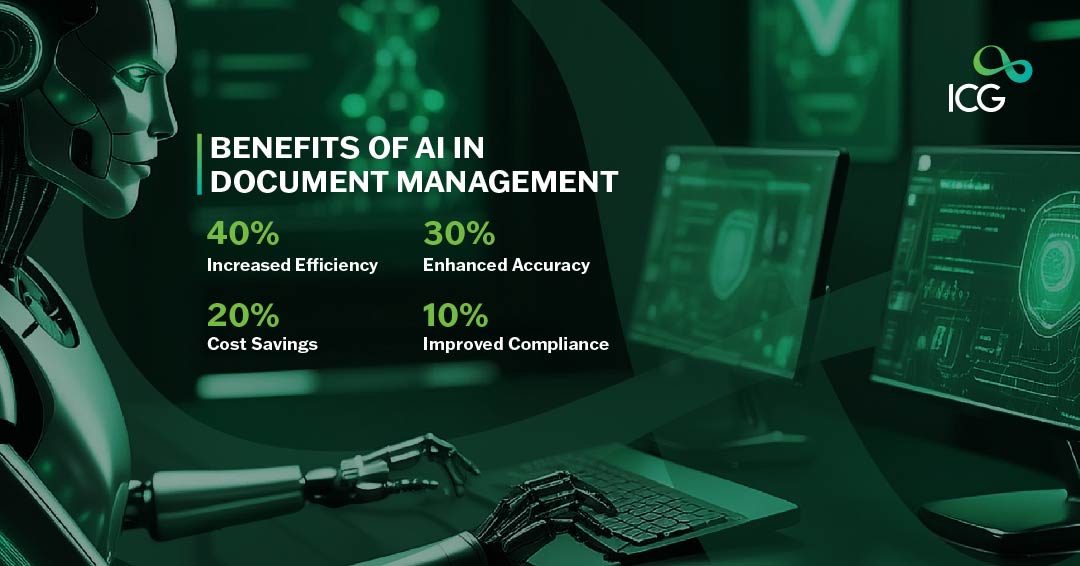Technology is growing at an unimaginable speed, and to keep up, businesses are constantly looking for ways to work smarter, not harder. One of the most exciting yet ground-breaking advancements in this league is the use of Artificial Intelligence (AI) and that too for optimizing document review processes. Imagine you are spending only 50% of the time reviewing documents.
For many organizations, this dream has turned into reality by embracing AI at the right time and through the right expertise.
But how exactly is AI making it possible? This blog highlights the core hidden capabilities of AI, turning boring human jobs into quick and easy tasks and freeing up employees to do more brainer activities.
The Role of AI in Document Review
AI is shaking up how organizations tackle document review. By automating regular tasks and offering innovative analytical tools, AI helps teams manage more documents faster and with greater accuracy. As a result, businesses in all sectors are jumping on the AI bandwagon to simplify their document processes, boost compliance, and cut costs.
Here is how it is contributing to the overall increase in productivity among teams:
- Speed and Efficiency
One of the most witnessed benefits of AI in document review is its ability to fasten the entire process. Traditional methods often involve humans reviewing thousands of documents, which takes too much time and makes the review process prone to human error. AI-powered tools use sophisticated algorithms to quickly identify relevant documents from massive databases, which eventually reduce review times.
- Document Summarization: AI can create concise summaries of lengthy documents, giving professionals to make faster decisions regarding responsiveness and relevance. This capability not only shortens the review cycle but also prioritizes the review of critical documents.
- Workflow Prioritization: Advanced AI systems utilize insights from previous labeling decisions to prioritize documents likely to be responsive or relevant. This helps accelerate the entire review process, enabling teams to meet tight deadlines with confidence.
- Accuracy and Consistency
Accuracy is one factor that can’t be compromised, especially in sectors like legal, finance, insurance, healthcare, etc., where oversight can have serious consequences. Artificial Intelligence enhances accuracy by reducing the risk of mistakes and providing consistent application of review criteria.
- Smart Labeling: Using machine learning algorithms, AI systems track how reviewers label documents and apply those labels to new documents that share similar characteristics. This consistency not only improves efficiency but also reduces the likelihood of missing critical information.
- Contextual Insights: AI analyzes data minutely to expose contextual relationships between custodians and content. This understanding is crucial for identifying responsive data swiftly and accurately, thereby minimizing oversight and enhancing the overall quality of the review.
- Cost Reduction
AI is a game-changer when it comes to document reviews. Taking over those tedious, time-consuming tasks speeds things up and makes everything more accurate. This means companies can save huge on labor costs and dodge the headaches that human mistakes invite. Plus, since AI can reuse coding decisions, there’s less need for repeated reviews, which helps keep costs down even more. So, it’s a win-win all around!
- Single-Instance Storage: AI systems ensure that all the documents are collected, analyzed, and stored just once, irrespective of their relevance across multiple scenarios, eliminating redundant processing and storage costs while facilitating seamless access to documents as needed.
- Process Orchestration: You can easily configure process orchestration powered by AI to enable efficient collaboration within teams and with external counsel. Automated workflows reduce manual intervention, decreasing both the time and cost associated with traditional review methods.

Real-World Applications of AI in Document Review
The practical applications of AI in document review are vast and varied across different sectors:
Legal Sector
AI-driven e-discovery software has become pivotal in managing large volumes of data. For example, businesses employing technology-assisted review (TAR) can train their systems on a subset of manually reviewed documents, known as a “seed set”, to efficiently identify relevant information in the remaining documents. This hybrid approach not only combines human expertise with AI capabilities but also speeds up the process. Studies show that AI can cut down document review time by up to 70%, allowing legal teams to focus on more strategic tasks rather than getting bogged down by tedious reviews.
Corporate Sector
In corporate environments, especially during mergers and acquisitions (M&A), time is highly critical. Legal and finance teams can use AI tools to analyze contracts quickly, identifying key terms and potential risks, on the same side, making sure compliance is adhered to with regulatory requirements.
For example, AI systems can automatically extract important clauses and summarize lengthy contracts, minimizing review times by as much as 50%. According to a McKinsey & Company study, organizations that adopt AI for contract analysis are experiencing more savings in review time, allowing for more informed decision-making during high-stakes transactions.
Healthcare Sector
Healthcare is also one of those sectors getting benefits from AI capabilities. Organizations like IQVIA have developed intelligent document review systems that review clinical trial documents 50% faster than any human can ever do.
By automating the extraction and sorting of data from various health-related documents, many AI tools are proven to speed up regulatory submission and patient record management with utmost accuracy.
Government Agencies
Government entities have also joined the trail of integrating AI into their document management processes. A local council can implement an AI system to manage the review of policy documents and legislative texts. The result was surprisingly good, showing a significant reduction in document review time while maintaining high-quality outcomes across all analyses.
Reports from the National Archives show that such implementations have led to productivity gains of over 60%, allowing government officials to allocate resources more effectively and respond to public inquiries faster.
The ICG Approach
At ICG, we offer a customized approach that empowers your teams with the latest insights and technology expertise to navigate the demands of today’s digital age. As Saudi Arabia embarks on its digital transformation journey, ICG plays a pivotal role in shaping the Kingdom’s tech landscape by providing cutting-edge solutions, strategic consultancy, and fostering innovation. Our comprehensive guidance, from fundamental concepts to practical implementation, helps organizations mitigate risks, stay ahead of the competition, and unlock their full potential in the accelerating digital environment.
Ready to talk?
Request your free Consultation to learn more about ICG’s capabilities and enablement to embark on a transformative expedition toward the summit of success.








